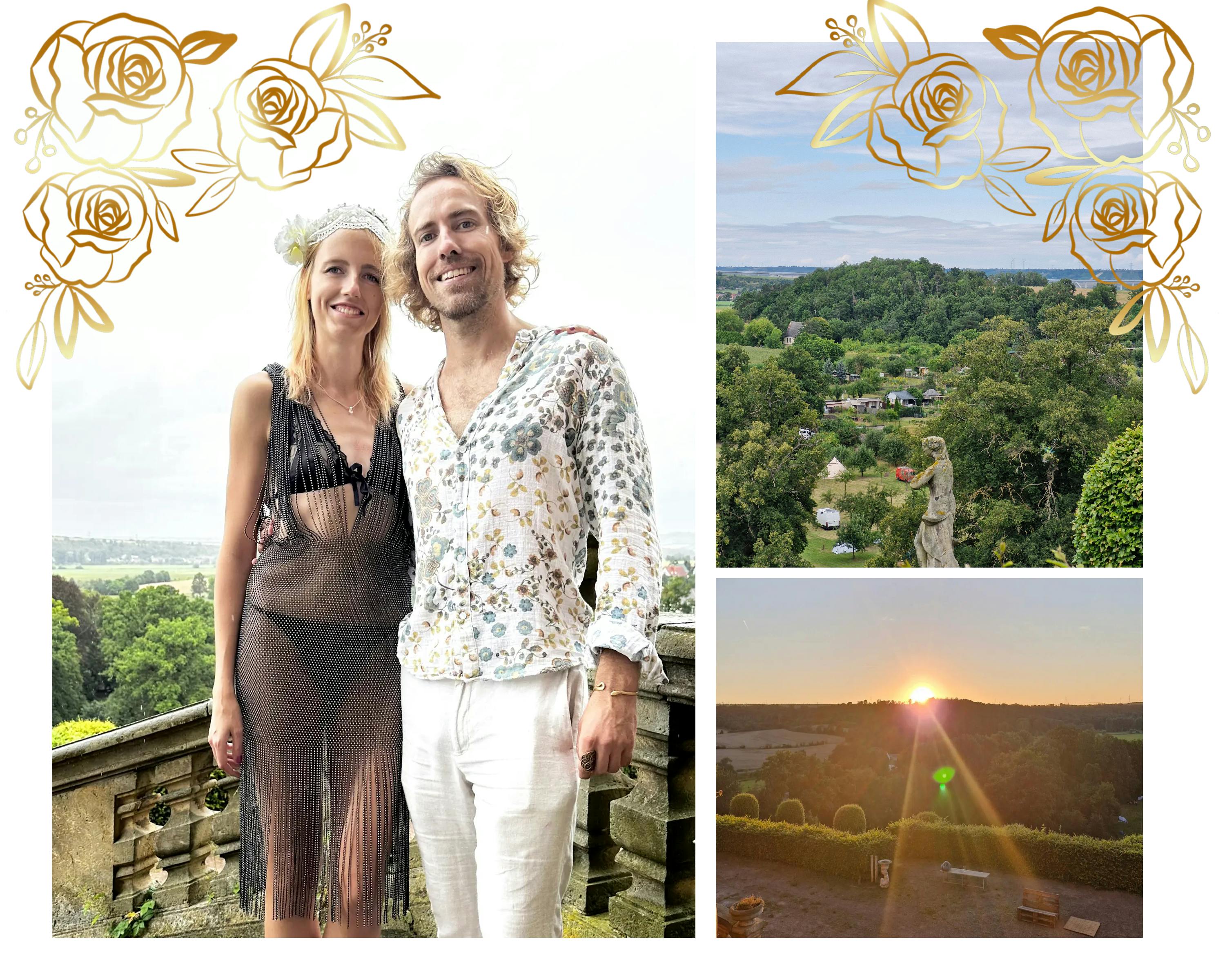
On the Nature of Things
https://images.prismic.io/syntia/Zra2NEaF0TcGI1l__SimpleWedding4Grid.jpg?auto=format,compress
Hedoné, meaning of a ‘pleasure’ that reveals a person’s character. Aristotle identified it as pathos that refers to “complaints of the soul”, which has three main functions: the mindset, the variation of emotions, and the motive or influence over it. The shared knowledge helped us discover the emotional and vulnerable side of ourselves and our loved ones. It was one of the strongest experiences at Hedoné festival, opening us to complete trust and form stronger connections and growth in relationships.
It practices Ethical Hedonism, which is based on the belief that transformative change, whether in the individual or in society, can occur only through in-depth personal participation.
The event itself took place at Burgscheidungen Castle with historical heritage dating back to the 8th century.
Hedoné movement shares a vision to grow a global network of individuals and develop spaces liberated to experience and learn about meditation and wellbeing, body positivity, yoga and body movement, sound and healing therapy, dancing and contact work, tantric practice, opening up to intimacy, mindfulness, and a celebration of the sensuality of the human body.
It opened a new world to me with no space to the fear, shame or judgement. The closing ceremony and voice of Pascale Caristo was the highlight of the event empowering us with her story, the truth, trust, courage and love.
The selected sound artists transformed the castle into a dream, guiding the guests through spiritual enlightenment and best experiences of their life. Thanks TŌKI sound master for the best parties in the undercroft, unlocking a vault to the secret underground portal from medieval times.
The ambience of the celebration is inspired by the poem “De Rerum Natura”, an ode to ethical hedonism. Decoration and dress code is influenced by the botanical world- flowers, feathers, shells, reusable objects from nature, light colored fabric. Body paint and bio-glitter, as well as nudity is encouraged and celebrated. Hedoné welcomes individuals of all race, age and gender to explore radical expression under the theme of divine femininity.
Thank you Max for inviting me to Hedoné and building this beautiful journey together!
Celebrating the joys and pleasures of the body, spirit and mind
The Senses and Mental Pictures
Bodies that strike the eyes, awaking sight.
From certain things flow odours evermore,
As cold from rivers, heat from sun, and spray
From waves of ocean, eater-out of walls
Around the coasts. Nor ever cease to flit
The varied voices, sounds athrough the air.
Then too there comes into the mouth at times
The wet of a salt taste, when by the sea
We roam about; and so, whene’er we watch
The wormword being mixed, its bitter stings.
To such degree from all things is each thing
Borne streamingly along, and sent about
To every region round; and Nature grants
Nor rest nor respite of the onward flow,
Since ‘tis incessantly we feeling have,
And all the time are suffered to descry
And smell all things at hand, and hear them sound.
…
And so we see how wind affects our body,
As if one thing were beating on the same
And giving us the feel of its own body
Outside of us. Again, whene’er we thump
With finger-tip upon a stone, we touch
But the rock’s surface and the outer hue,
Nor feel that hue by contact- rather feel
The very hardness deep within the rock.
On the Nature of Things, book IV By Lucretius, Written 50 B.C.E, Translated by William Ellery Leonard
The following poetry is taken from the edition by Sylvia Plath following her last manuscript. It has been restored by her daughter Frieda Hughes, reinstating her original selection and arrangement.
The Rival
If the moon smiled, she would resemble you.
You leave the same impression
Of something beautiful, but annihilating
Both of you are great light borrowers.
Her O-mouth grieves at the world; yours is unaffected.
And your first gift is making stone out of everything.
I wake to a mausoleum; you are here,
Ticking your fingers on the marble table, looking for cigarettes,
And dying to say something unanswerable.
The moon, too, abases her subjects,
But in the daytime she is ridiculous.
Your dissatisfactions, on the other hand,
Arrive through the mailslot with loving regularity,
White and blank, expansive as carbon monoxide.
No day is safe from news of you,
Walking about in Africa maybe, but thinking of me.
Gulliver
Over your body the clouds go
High, high and icily
And a little flat, as if they
Floated on a glass that was invisible.
Unlike swans,
Having no reflections;
Unlike you
With no strings attached.
All cool, all blue. Unlike you-
You, there on your back,
Eyes to the sky.
The spider-men have caught you,
Winding and twining their petty fetters,
Their bribes-
So many silks.
…
That revolve in Crivelli, untouchable.
Let this eye be an eagle,
The shadow of his lip, an abyss.
The Night Dances (2)
These lamps, these planets
Falling like blessings, like flakes
Six-sided, white
On my eyes, my lips, my hair
Touching and melting.
Nowhere.
Morning Song
Love set you going like a fat gold watch.
The midwife slapped your footsoles, and your bald cry
Took its place among the elements.
Our voices echo, magnifying your arrival. New statue
In a drafty museum, your nakedness
Shadows our safety. We stand round blankly as walls.
I’m no more your mother
Than the cloud that distils a mirror to reflect its own slow
Effacement at the wind’s hand.
All night your moth-breath
Flickers among the flat pink roses. I wake to listen:
A far sea moves in my ear.
One cry, and I stumble from bed, cow-heavy and floral
In my Victorian nightgown.
Your mouth opens clean as cat’s. The window square
Whitens and shallows its dull stars. And now you try
Your handful of notes;
The clear vowels rise like balloons.